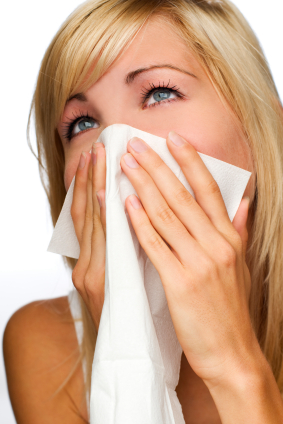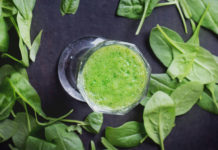by: Dr. Craig A. Maxwell
A poor immune system can leave you feeling weak and vulnerable, especially during this time of year. If you feel as though you’re constantly fending off colds and flu, your immune system needs support.
Causes of a Poor Immune System
- Poor Diet
The primary cause of low immune system is often nutrient deficiencies caused by a poor diet. Without certain necessary nutrients (vitamin D3, zinc, vitamin C), your immune system is unable to function adequately, which can leave you more vulnerable to bacterial or viral invasion
If you’re currently eating the Standard American Diet of fast food, microwavable meals, canned food, pre-made soup mixes, snack cakes, candy, and diet soda, your body will be in a constantly weakened state. These food-like products do not nourish you, they only fill your gut and cause a temporary junk food high caused by neurotoxic chemical ingredients.
The Standard American Diet is one of the primary causes of chronic disease in the United States. This is why it is so important to slowly wean off of these foods and invest in healthier fare.
Organic vegetables, fruit, nuts, seeds, meat, poultry, wild-caught fish, and healthy fats such as coconut oil and butter give your body the nourishment it needs to function at its best.
- Environmental Toxins
Another cause of depressed immunity is environmental toxins. You may not realize it but your cleaning products, air freshener, and cosmetics can lower your immune resistance and lead to the development of chronic disease.
These chemicals include, but are in no way limited to:
- Fluoride
According to an Australian study conducted in 1991, habitual ingestion of even small amounts of fluoride has been shown to decrease the function of your immune system.
- Mercury
Mercury, a heavy metal found in some vaccines, dental amalgams, and certain types of fish, is an immunotoxin that suppresses your healthy immune system and leaves you vulnerable to chronic infection and disease. A study conducted on 7,000 patients showed that 90% had an adverse immune reaction when exposed to even low levels of mercury.
- Phthalates
In order to understand its environment and protect you from disease, your immune system must learn to tell the difference between you and a foreign entity. Phthalates, chemical plasticizers found in hundreds of household products, disrupt the immune system “education” of immature B lymphocytes and can cause your immune system to turn on healthy living cells and tissues.
- Triclosan
Triclosan is a synthetic antibacterial agent that was once limited to use in hospitals. Now, this chemical is in everything from hand sanitizers to kitchenware. Clinical studies have shown that chronic exposure to Triclosan has been shown to interfere with your cell mediated immune system; a system that differentiates between your cells and harmful foreign invaders. It may be the reason autoimmune disease is on the rise.
- Stress
Stress lowers the amount of killer T cells your body produces. Severe, prolonged stress can stop their production altogether. Furthermore, chronic stress can lead to a condition called adrenal fatigue. Adrenal fatigue occurs when your adrenals, located atop your kidneys, over-produce fight or flight chemicals like epinephrine, norepinephrine, and cortisol until the adrenals become completely worn out.
- Lack of Sleep
The average adult needs 7-9 uninterrupted hours of deep sleep in order to function at their best. Without adequate sleep, your body is unable to produce enough protective proteins called cytokines, which protect your body against infectious disease.
- Excessive Use of Antibiotics
Antibiotics were originally designed for use when all other healing options had been exhausted. These days, powerful antibiotics are often given out to patients suffering from a simple cold. This can do serious damage to your immune system by eradicating not only harmful bacteria but the healthy type as well. Without sufficient healthy gut bacteria, your immune system weakens and you become more susceptible to bacterial infections and chronic disease.
Symptoms of a Poor Immune System
- Frequent Colds and Flu
If it seems you come down with every little cold and flu that’s going around, you may have a poor immune system. The average healthy adult should only become sick enough to miss work or school once or twice per year. If you’re getting sick more often than that, your immune system may be compromised.
- Chronic Fatigue
Feeling constantly drained and weak is another possible symptom of a poor immune system. If you get at least 8 hours of sleep each night but still don’t feel rested, it could be a sign of low immunity. Also, be sure to ask you doctor about the possibility of sleep apnea.
- Slow Wound Healing
Slow wound healing can be another indicator of poor immune system function. It can also be caused by type II diabetes.
- Weight Gain
Leptin imbalance can cause weight gain and affect the function of your immune system. If you’re having trouble taking weight off, it could be a sign that your immune system is not functioning properly. Inability to lose weight can also be a sign of metabolic disorder or thyroid disease.
- Candida Overgrowth
Frequent yeast infections, jock itch, athlete’s foot, and oral thrush are all an indicator that healthy bacteria are low and candida is growing out of control. Prescription and over-the-counter remedies for these conditions only suppress symptoms, they do nothing to address the underlying cause.
Nutrients to Boost Your Immune System Naturally
A malfunctioning immune system can often be treated naturally. I recommend making the dietary and lifestyle changes necessary to remove as many toxins from the environment as possible. I also advise regular exercise, stress reduction, and plenty of deep, uninterrupted sleep.
Excessive antibiotic use has weakened our immune systems and caused a condition called antibiotic resistance. New “superbugs” are developing each day and modern medical science is struggling to catch up. Even the healthiest diet and a clean lifestyle will not be enough to protect you from the onslaught of these new diseases.
This is why I recommend the following immune-boosting nutrients
- Zinc
Zinc deficiency is a common problem as you often cannot get enough of this vital nutrient from food alone. Research has proven that the nutrient density in our soil and, as a result, our food, has decreased by an incredible 50 percent in the past 100 years.
Furthermore, excessive use of antibiotics, NSAID pain relievers, and acid reflux drugs deplete the natural nutrient stores from your body.
Zinc has been shown to prevent colds, shorten their duration, and decrease your susceptibility to them. It also plays a vital role in over 50 different proteins and enzymes in your body. These enzymes are critical for immune health, overall cellular metabolism, and control of protein synthesis.
- Larch Arabinogalacten
Larch arabinogalactan is a biopolymer made up of arabinose and galactose monosaccharides from the American larch tree. Studies have indicated that larch arabinogalacten activates natural killer cells and macrophages. It helps strengthen your immune system naturally.
- Aloe Vera Extract
The polysaccharide and flavonoid content of aloe vera extract has strong free radical scavenging activity and immune-boosting properties. Aloe vera extract also offers strong anti-fungal and anti-inflammatory benefits, making it an deal nutrient for those living with chronic digestive malfunction and candida overgrowth.
- Olive Leaf Extract
Olive leaf extract has many uses, including helping the immune system. It also has anti-oxidant, anti-inflammatory and disease fighting characteristics, largely do its active ingredient, oleuropein.

My Diamond Nutritional’s Cell Support Formula contains a synergistic blend of each of these nutrients. They are designed to work in harmony to support your immune system.
Just because everyone else is getting sick around you doesn’t mean you’re doomed to as well. When you give your immune system the support it needs, you may not need to rely on antibiotics, and have fewer infections. Your body will finally be able do what it was designed to do: protect you from disease.








